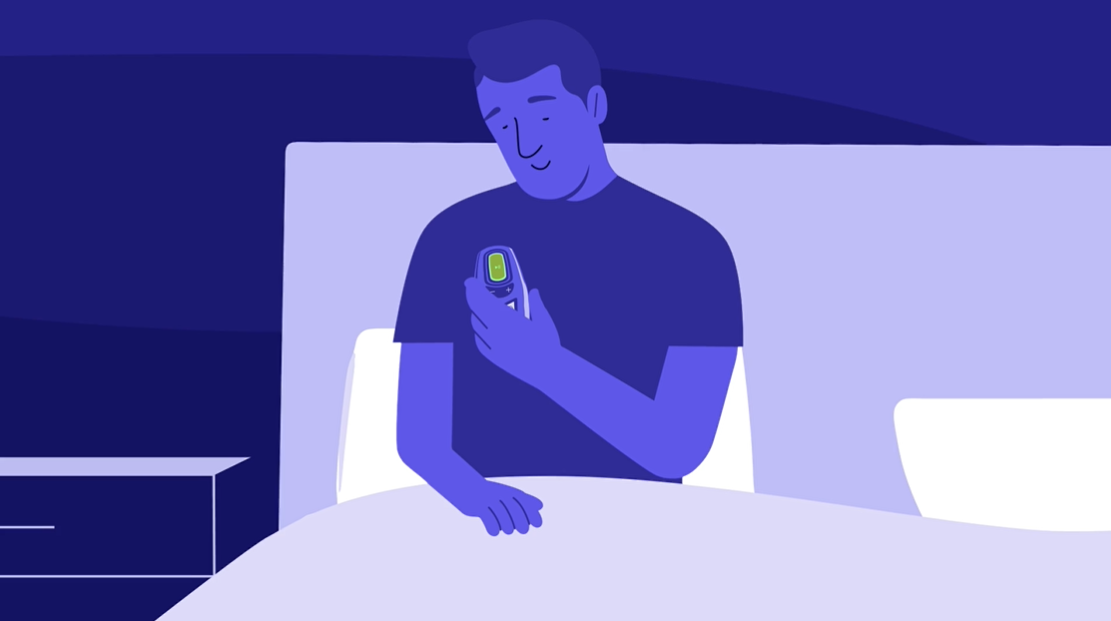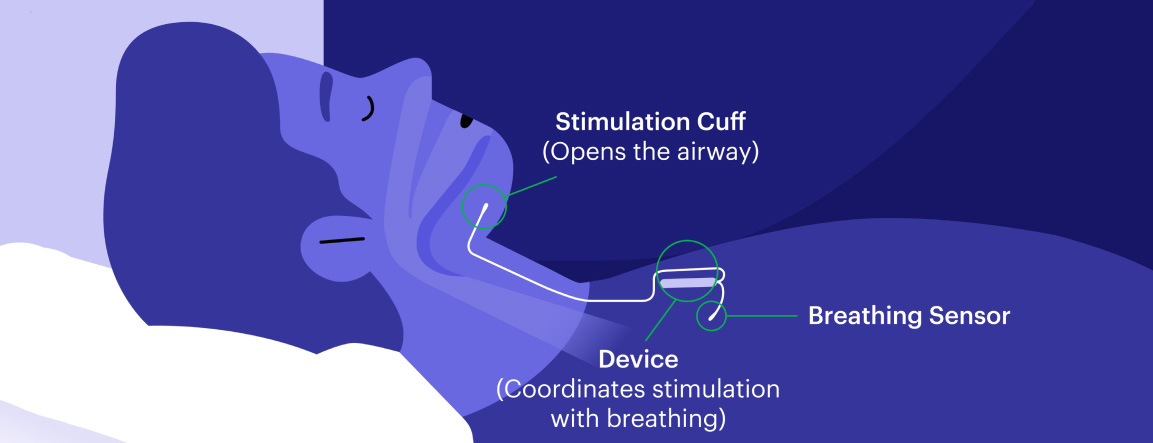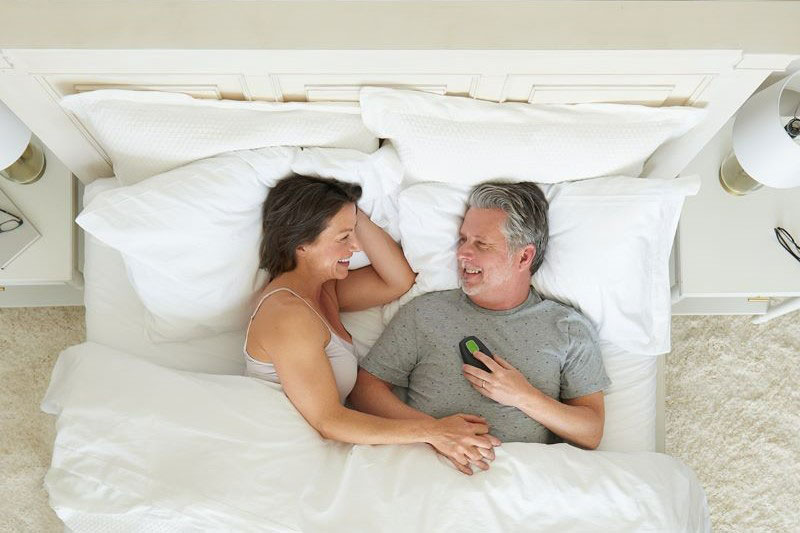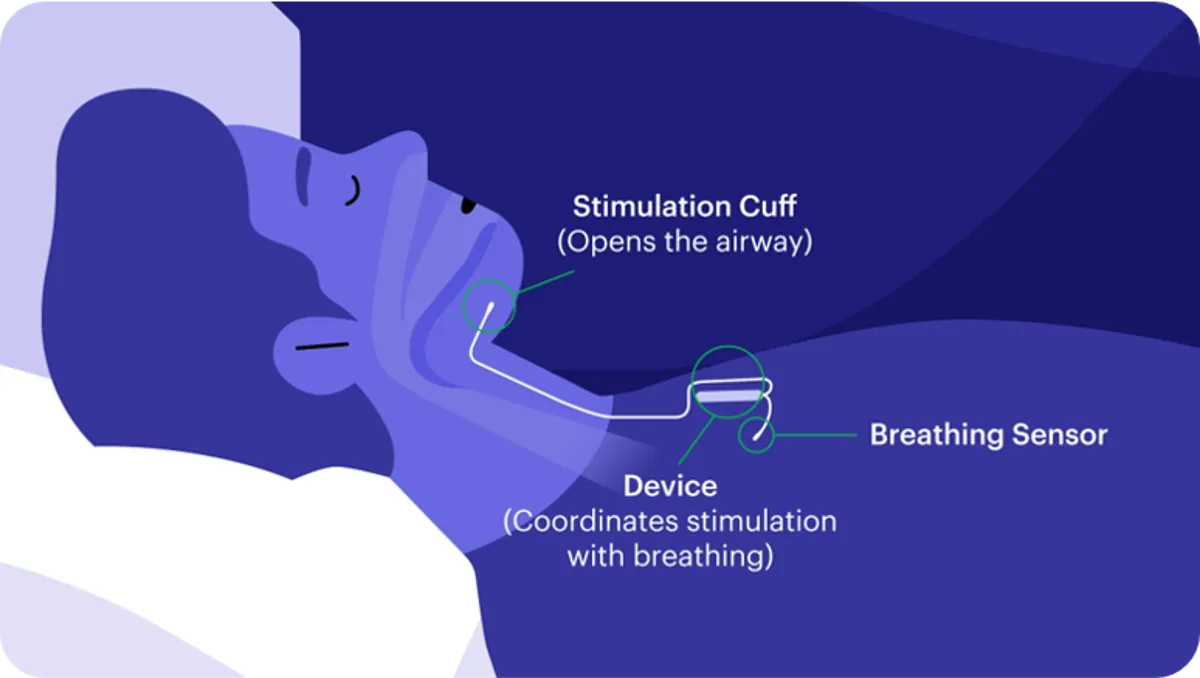หลับสบาย ไร้หน้ากาก ไร้ท่อ.™
เครื่องกระตุ้นเส้นประสาทใต้ลิ้น (Hypoglossal nerve) เป็นกล่องอุปกรณ์อิเล็กทรอนิกส์ ใช้ฝังลงไปที่บริเวณเหนือกล้ามเนื้อหน้าอก และเส้นประสาทใต้ลิ้น เพื่อรักษาที่ต้นเหตุของภาวะหยุดหายใจขณะหลับ ด้วยการกดเพียงปุ่มเดียว.
เครื่องกระตุ้นเส้นประสาทใต้ลิ้น คืออะไร?
การรักษา ด้วย Inspire ซึ่งเป็นเครื่องกระตุ้นเส้นประสาทใต้ลิ้น โดยมุ่งหมายการรักษาต้นตอของภาวะหยุดหายใจขณะหลับจากการอุดกั้น.
Inspire ทำงานโดยไปกระตุ้นเส้นประสาทใต้ลิ้น ซึ่งลิ้นนั้นเป็นกล้ามเนื้อที่สำคัญในการความคุมระบบการหายใจ การกระตุ้นนี้จะทำให้ป้องกันการตีบตันของทางเดินหายใจ จึงทำให้ท่านสามารถหายใจได้อย่างปกติในขณะนอนหลับ.

ผลตอบรับจากผู้ที่รับการรักษาด้วย Inspire
90%
ของคู่สมรสรายงานว่าไม่มีเสียงกรนหรือมีเสียงกรนเบา.²
93%
ของผู้ป่วยแนะนำ Inspire ให้เพื่อนหรือครอบครัว.³
79%
ของค่าภาวะการหยุดหายใจลดลง.²
91%
ของผู้ป่วยกล่าวว่า Inspire ดีกว่า CPAP.³
เครื่องกระตุ้นเส้นประสาทใต้ลิ้น ทำงานอย่างไร?
อุปกรณ์นี้มีการออกแบบมาให้ทำงานตามลักษณะการหายใจในรูปแบบเฉพาะของแต่ละผู้ใช้งาน โดยจะกระตุ้นเส้นประสาทใต้ลิ้น(hypoglossal nerve) ที่ควบคุมการเคลื่อนไหวของลิ้นและกล้ามเนื้อทางเดินหายใจที่สำคัญ การกระตุ้นนี้ช่วยให้ทางเดินหายใจเปิดโล่ง หายใจได้สะดวกมากยิ่งขึ้น ตลอดการนอนหลับ มาพร้อมรีโมทคอนโทรลที่ใช้งานง่าย เพียงคุณกดปุ่มเดียว เพื่อเปิดใช้งานก่อนเข้านอนและปิดเมื่อตื่นนอน.


คุณอาจจะเหมาะสมกับการรักษาด้วยเครื่องกระตุ้นเส้นประสาทใต้ลิ้น (HGNS) ถ้า......
- คุณมีภาวะหยุดหายใจขณะหลับจากการอุดกั้นในระดับปานกลางถึงรุนแรง.
- คุณไม่สามารถใช้หรือทนกับการใช้เครื่องCPAP ได้.
- คุณไม่ได้เป็นโรคอ้วนอย่างรุนแรง.
- คุณมีอายุ 18 ปีหรือมากกว่า.
Private Insurance Applies
If you are considering HGNS therapy you can consult an HGNS-trained doctor to understand the costs and reimbursement process in detail.
Many major insurance providers have approved this treatment on an individual basis. For those without private insurance coverage, the doctor may also provide information about other funding options.

HGNS Therapy in Singapore
Singapore offers advanced HGNS therapy, including Inspire, through world-class specialists and hospitals. With cutting-edge facilities and experienced sleep-trained doctors, patients can expect safe and effective treatment. Many private insurance plans cover HGNS therapy, check with your provider for details.
Head of Otorhinolaryngology at SingHealth Duke-NUS Sleep Centre, is a leading expert in Sleep Apnea Surgery, trained at Stanford, and holds a Master’s in Sleep Medicine. Renowned for pioneering Transoral Robotic Surgery in Southeast Asia, he is a prolific researcher, author, and international speaker on sleep apnea and it’s surgical treatments.
Dr. Shaun Loh, an ENT surgeon at The ENT Voice & Snoring Clinic in Gleneagles Hospital, Singapore, specializes in treating snoring and obstructive sleep apnea (OSA), offering advanced therapies such as robotic surgery and hypoglossal nerve implants. Formerly Chief of Sleep Surgery at SGH, he trains regional ENT specialists in OSA treatment. A clinical assistant professor and award-winning physician, he continues to provide expert care at multiple hospitals in Singapore.
Dr. Crystal Cheong, a consultant at NUH leading the sleep subspecialty clinic and specialises in holistic care for sleep disorders, including obstructive sleep apnea. Trained in Sleep Medicine and Surgery at the University of Pennsylvania, she combines medical and surgical expertise. A clinical lecturer at NUS, she is dedicated to patient-centered care.
Dr. Han Hong Juan, an ENT surgeon at The ENT Voice & Snoring Clinic in Mount Elizabeth Hospital, is a pioneer in advanced treatments for obstructive sleep apnea, including being among the first in Singapore to use Transoral Robotic Surgery and perform Inspire hypoglossal nerve stimulator implants. Specializing in snoring, sleep apnea, and voice and swallowing disorders, he offers a personalized, multidisciplinary approach encompassing weight management, dental appliances, CPAP, and surgery.
Dr. Phua Chu Qin, Director of Sleep Surgery at Sengkang General Hospital, is a fellowship-trained sleep surgeon specializing in obstructive sleep apnea. She completed advanced training in Sleep Surgery under Professor Toh Song Tar and Craniofacial Surgery in Taiwan, along with certifications in Transoral Robotic Surgery and Hypoglossal Nerve Implantation. Known for innovative approaches, she developed a tele-myofunctional therapy app to improve access to snoring treatments and is integrating AI into therapy monitoring through a SingHealth grant.
Dr. Paul Mok, an MOH-accredited ENT specialist with over 20 years of experience, specialises in voice, swallowing disorders, and obstructive sleep apnea. Formerly Head of ENT at Alexandra and Khoo Teck Puat Hospitals and Deputy Chairman of Khoo Teck Puat’s Medical Board, he is currently practising at My ENT Specialist and serves as Chairman of the Singapore Academy of Medicine Chapter of ENT Surgeons. A passionate educator and visiting consultant at multiple hospitals, Dr. Mok is recognized for his expertise in treating a broad range of ENT conditions, including nasal, sinus, ear, and head and neck disorders.
Dr. Lau Hung Tuan, an international fellowship-trained ENT specialist in Singapore currently practising in My ENT Specialist, specializes in snoring and obstructive sleep apnea (OSA), providing personalized, holistic care. A graduate of University College London with distinctions, he completed advanced training in Craniofacial Sleep Surgery at Chang Gung Memorial Hospital, Taiwan. Formerly a Consultant and clinical lead for Snoring and OSA Surgery at Khoo Teck Puat Hospital, Dr. Lau continues to manage complex sleep cases as a visiting specialist at Tan Tock Seng Hospital.
Dr. Leonard Soh, an Otolaryngology specialist with a Medical Degree and Masters from the Yong Loo Lin School of Medicine, NUS, focuses on Sleep Surgery for sleep-disordered breathing. After completing a rigorous 5-year residency and achieving board certification, he has contributed to research, publications, and medical education. Dedicated to providing high-quality care, Dr. Leonard is committed to advancing the field of sleep surgery while mentoring and sharing knowledge with others in the medical community.
Dr. Chong, a Senior Consultant at Tan Tock Seng Hospital, specialises in sleep medicine and obstructive sleep apnea surgery. With advanced training in transoral robotic surgery under Professor Claudio Vicini in Italy and a Master’s in Sleep Medicine from the University of Oxford, he combines clinical expertise with innovative care.
Dr. Tan, an Otolaryngology specialist with a focus on Sleep Medicine and Surgery, practices both general ENT and sleep disorder management. A graduate of NUS Yong Loo Lin School of Medicine, he obtained his Specialist Accreditation in 2015 and has led the ENT Sleep Service at Khoo Teck Puat Hospital since 2015. He was the first in Singapore to receive an HMDP for training in hypoglossal nerve stimulation for OSA at UPMC in the USA. In addition to his clinical work, Dr. Tan is involved in medical education, serving as faculty for NUS, NTU, and the NHG ENT Residency program, and is part of the team building Woodlands Health.
คำถามที่พบบ่อย
HGNS ช่วยรักษาปัญหาภาวะหยุดหายใจขณะหลับจากการอุดกั้น (OSA)จากต้นเหตุ โดยช่วยเปิดทางเดินหายใจตลอดการนอน ซึ่งต่างจาก CPAP ที่เป็นการอัดแรงดันอากาศจากภายนอก.
เฉกเช่นเดียวกับการทำหัตถการทางการแพทย์อื่นๆซึ่งอาจจะมีความเสี่ยงได้ สำหรับความเสี่ยงที่อาจจะเกิดขึ้นการทำหัตถการ HGNS นั้น อาจจะมีได้ดังนี้ การติดเชื้อที่ตำแหน่งที่ฝังอุปกรณ์ , อาการลิ้นอ่อนแรงชั่วคราว, อึดอัดจากอุปกรณ์ หรือการระคายเคืองของเส้นประสาท โดยท่านสามารถปรึกษาและสอบถามความเสี่ยงกับแพทย์ผู้เชี่ยวชาญ เพื่อประเมินว่าการรักษาด้วย HGNS เหมาะสมกับกับท่านหรือไม่.
การผ่าตัดใส่เครื่องHGNS เป็นการทำหัตถการเล็กที่มีความปลอดภัยและฟื้นตัวไว โดยคนไข้ส่วนใหญ่ฟื้นตัวได้เร็วและพบว่าคุณภาพการนอนหลับดีขึ้นหลังจากที่ได้รับการเปิดเตรื่อง.
เครื่องHGNS ของ Inspire Therapy มีการออกแบบมาเพื่อให้ใช้งานได้ต่อเนื่องหลายปี เพียงแต่อาจจะต้องเปลี่ยนแบตเตอรี่ในปีที่ 10 ซึ่งการเปลี่ยนแบตเตอรี่นั้นสามารถทำอย่างง่ายดาย.
แหล่งข้อมูลอ้างอิง
1 ADHERE Registry: Data on file
2 Suurna MV, Steffen A, Boon M, et al. Impact of Body Mass Index and Discomfort on Upper Airway Stimulation: ADHERE Registry 2020 Update. Laryngoscope 2021; 131(11): 2616-2624
3 Bosschieter et al. Similar effect of hypoglossal nerve stimulation for OSA in five disease categories. J Clin Sleep Med. 2022 Jun 1;18(6):1657-166.
801-050-000, Rev W

หลับสบาย ไร้หน้ากาก ไร้ท่อ.™
เครื่องกระตุ้นเส้นประสาทใต้ลิ้น (Hypoglossal nerve) เป็นกล่องอุปกรณ์อิเล็กทรอนิกส์ ใช้ฝังลงไปที่บริเวณเหนือกล้ามเนื้อหน้าอก และเส้นประสาทใต้ลิ้น เพื่อรักษาที่ต้นเหตุของภาวะหยุดหายใจขณะหลับ ด้วยการกดเพียงปุ่มเดียว.

เครื่องกระตุ้นเส้นประสาทใต้ลิ้น คืออะไร?
การรักษา ด้วย Inspire ซึ่งเป็นเครื่องกระตุ้นเส้นประสาทใต้ลิ้น โดยมุ่งหมายการรักษาต้นตอของภาวะหยุดหายใจขณะหลับจากการอุดกั้น.
Inspire ทำงานโดยไปกระตุ้นเส้นประสาทใต้ลิ้น ซึ่งลิ้นนั้นเป็นกล้ามเนื้อที่สำคัญในการความคุมระบบการหายใจ การกระตุ้นนี้จะทำให้ป้องกันการตีบตันของทางเดินหายใจ จึงทำให้ท่านสามารถหายใจได้อย่างปกติในขณะนอนหลับ.
ผลตอบรับจากผู้ที่รับการรักษาด้วย Inspire
90%
ของคู่สมรสรายงานว่าไม่มีเสียงกรนหรือมีเสียงกรนเบา.²
93%
ของผู้ป่วยแนะนำ Inspire ให้เพื่อนหรือครอบครัว.³
79%
ของค่าภาวะการหยุดหายใจลดลง.²
91%
ของผู้ป่วยกล่าวว่า Inspire ดีกว่า CPAP.³

เครื่องกระตุ้นเส้นประสาทใต้ลิ้น ทำงานอย่างไร?
อุปกรณ์นี้มีการออกแบบมาให้ทำงานตามลักษณะการหายใจในรูปแบบเฉพาะของแต่ละผู้ใช้งาน โดยจะกระตุ้นเส้นประสาทใต้ลิ้น(hypoglossal nerve) ที่ควบคุมการเคลื่อนไหวของลิ้นและกล้ามเนื้อทางเดินหายใจที่สำคัญ การกระตุ้นนี้ช่วยให้ทางเดินหายใจเปิดโล่ง หายใจได้สะดวกมากยิ่งขึ้น ตลอดการนอนหลับ มาพร้อมรีโมทคอนโทรลที่ใช้งานง่าย เพียงคุณกดปุ่มเดียว เพื่อเปิดใช้งานก่อนเข้านอนและปิดเมื่อตื่นนอน.

คุณอาจจะเหมาะสมกับการรักษาด้วยเครื่องกระตุ้นเส้นประสาทใต้ลิ้น (HGNS) ถ้า......
- คุณมีภาวะหยุดหายใจขณะหลับจากการอุดกั้นในระดับปานกลางถึงรุนแรง.
- คุณไม่สามารถใช้หรือทนกับการใช้เครื่องCPAP ได้.
- คุณไม่ได้เป็นโรคอ้วนอย่างรุนแรง.
- คุณมีอายุ 18 ปีหรือมากกว่า.

Private Insurance Applies
If you are considering HGNS therapy you can consult an HGNS-trained doctor to understand the costs and reimbursement process in detail.
Many major insurance providers have approved this treatment on an individual basis. For those without private insurance coverage, the doctor may also provide information about other funding options.
HGNS Therapy in Singapore
Singapore offers advanced HGNS therapy, including Inspire, through world-class specialists and hospitals. With cutting-edge facilities and experienced sleep-trained doctors, patients can expect safe and effective treatment. Many private insurance plans cover HGNS therapy, check with your provider for details.
Head of Otorhinolaryngology at SingHealth Duke-NUS Sleep Centre, is a leading expert in Sleep Apnea Surgery, trained at Stanford, and holds a Master’s in Sleep Medicine. Renowned for pioneering Transoral Robotic Surgery in Southeast Asia, he is a prolific researcher, author, and international speaker on sleep apnea and it’s surgical treatments.
Dr. Shaun Loh, an ENT surgeon at The ENT Voice & Snoring Clinic in Gleneagles Hospital, Singapore, specializes in treating snoring and obstructive sleep apnea (OSA), offering advanced therapies such as robotic surgery and hypoglossal nerve implants. Formerly Chief of Sleep Surgery at SGH, he trains regional ENT specialists in OSA treatment. A clinical assistant professor and award-winning physician, he continues to provide expert care at multiple hospitals in Singapore.
Dr. Crystal Cheong, a consultant at NUH leading the sleep subspecialty clinic and specialises in holistic care for sleep disorders, including obstructive sleep apnea. Trained in Sleep Medicine and Surgery at the University of Pennsylvania, she combines medical and surgical expertise. A clinical lecturer at NUS, she is dedicated to patient-centered care.
Dr. Han Hong Juan, an ENT surgeon at The ENT Voice & Snoring Clinic in Mount Elizabeth Hospital, is a pioneer in advanced treatments for obstructive sleep apnea, including being among the first in Singapore to use Transoral Robotic Surgery and perform Inspire hypoglossal nerve stimulator implants. Specializing in snoring, sleep apnea, and voice and swallowing disorders, he offers a personalized, multidisciplinary approach encompassing weight management, dental appliances, CPAP, and surgery.
Dr. Phua Chu Qin, Director of Sleep Surgery at Sengkang General Hospital, is a fellowship-trained sleep surgeon specializing in obstructive sleep apnea. She completed advanced training in Sleep Surgery under Professor Toh Song Tar and Craniofacial Surgery in Taiwan, along with certifications in Transoral Robotic Surgery and Hypoglossal Nerve Implantation. Known for innovative approaches, she developed a tele-myofunctional therapy app to improve access to snoring treatments and is integrating AI into therapy monitoring through a SingHealth grant.
Dr. Paul Mok, an MOH-accredited ENT specialist with over 20 years of experience, specialises in voice, swallowing disorders, and obstructive sleep apnea. Formerly Head of ENT at Alexandra and Khoo Teck Puat Hospitals and Deputy Chairman of Khoo Teck Puat’s Medical Board, he is currently practising at My ENT Specialist and serves as Chairman of the Singapore Academy of Medicine Chapter of ENT Surgeons. A passionate educator and visiting consultant at multiple hospitals, Dr. Mok is recognized for his expertise in treating a broad range of ENT conditions, including nasal, sinus, ear, and head and neck disorders.
Dr. Lau Hung Tuan, an international fellowship-trained ENT specialist in Singapore currently practising in My ENT Specialist, specializes in snoring and obstructive sleep apnea (OSA), providing personalized, holistic care. A graduate of University College London with distinctions, he completed advanced training in Craniofacial Sleep Surgery at Chang Gung Memorial Hospital, Taiwan. Formerly a Consultant and clinical lead for Snoring and OSA Surgery at Khoo Teck Puat Hospital, Dr. Lau continues to manage complex sleep cases as a visiting specialist at Tan Tock Seng Hospital.
Dr. Leonard Soh, an Otolaryngology specialist with a Medical Degree and Masters from the Yong Loo Lin School of Medicine, NUS, focuses on Sleep Surgery for sleep-disordered breathing. After completing a rigorous 5-year residency and achieving board certification, he has contributed to research, publications, and medical education. Dedicated to providing high-quality care, Dr. Leonard is committed to advancing the field of sleep surgery while mentoring and sharing knowledge with others in the medical community.
Dr. Chong, a Senior Consultant at Tan Tock Seng Hospital, specialises in sleep medicine and obstructive sleep apnea surgery. With advanced training in transoral robotic surgery under Professor Claudio Vicini in Italy and a Master’s in Sleep Medicine from the University of Oxford, he combines clinical expertise with innovative care.
Dr. Tan, an Otolaryngology specialist with a focus on Sleep Medicine and Surgery, practices both general ENT and sleep disorder management. A graduate of NUS Yong Loo Lin School of Medicine, he obtained his Specialist Accreditation in 2015 and has led the ENT Sleep Service at Khoo Teck Puat Hospital since 2015. He was the first in Singapore to receive an HMDP for training in hypoglossal nerve stimulation for OSA at UPMC in the USA. In addition to his clinical work, Dr. Tan is involved in medical education, serving as faculty for NUS, NTU, and the NHG ENT Residency program, and is part of the team building Woodlands Health.
คำถามที่พบบ่อย
HGNS ช่วยรักษาปัญหาภาวะหยุดหายใจขณะหลับจากการอุดกั้น (OSA)จากต้นเหตุ โดยช่วยเปิดทางเดินหายใจตลอดการนอน ซึ่งต่างจาก CPAP ที่เป็นการอัดแรงดันอากาศจากภายนอก.
เฉกเช่นเดียวกับการทำหัตถการทางการแพทย์อื่นๆซึ่งอาจจะมีความเสี่ยงได้ สำหรับความเสี่ยงที่อาจจะเกิดขึ้นการทำหัตถการ HGNS นั้น อาจจะมีได้ดังนี้ การติดเชื้อที่ตำแหน่งที่ฝังอุปกรณ์ , อาการลิ้นอ่อนแรงชั่วคราว, อึดอัดจากอุปกรณ์ หรือการระคายเคืองของเส้นประสาท โดยท่านสามารถปรึกษาและสอบถามความเสี่ยงกับแพทย์ผู้เชี่ยวชาญ เพื่อประเมินว่าการรักษาด้วย HGNS เหมาะสมกับกับท่านหรือไม่.
การผ่าตัดใส่เครื่องHGNS เป็นการทำหัตถการเล็กที่มีความปลอดภัยและฟื้นตัวไว โดยคนไข้ส่วนใหญ่ฟื้นตัวได้เร็วและพบว่าคุณภาพการนอนหลับดีขึ้นหลังจากที่ได้รับการเปิดเตรื่อง.
เครื่องHGNS ของ Inspire Therapy มีการออกแบบมาเพื่อให้ใช้งานได้ต่อเนื่องหลายปี เพียงแต่อาจจะต้องเปลี่ยนแบตเตอรี่ในปีที่ 10 ซึ่งการเปลี่ยนแบตเตอรี่นั้นสามารถทำอย่างง่ายดาย.
แหล่งข้อมูลอ้างอิง
1 ADHERE Registry: Data on file
2 Suurna MV, Steffen A, Boon M, et al. Impact of Body Mass Index and Discomfort on Upper Airway Stimulation: ADHERE Registry 2020 Update. Laryngoscope 2021; 131(11): 2616-2624
3 Bosschieter et al. Similar effect of hypoglossal nerve stimulation for OSA in five disease categories. J Clin Sleep Med. 2022 Jun 1;18(6):1657-166.
801-050-000, Rev W

หลับสบาย ไร้หน้ากาก ไร้ท่อ.™
เครื่องกระตุ้นเส้นประสาทใต้ลิ้น (Hypoglossal nerve) เป็นกล่องอุปกรณ์อิเล็กทรอนิกส์ ใช้ฝังลงไปที่บริเวณเหนือกล้ามเนื้อหน้าอก และเส้นประสาทใต้ลิ้น เพื่อรักษาที่ต้นเหตุของภาวะหยุดหายใจขณะหลับ ด้วยการกดเพียงปุ่มเดียว.

เครื่องกระตุ้นเส้นประสาทใต้ลิ้น คืออะไร?
การรักษา ด้วย Inspire ซึ่งเป็นเครื่องกระตุ้นเส้นประสาทใต้ลิ้น โดยมุ่งหมายการรักษาต้นตอของภาวะหยุดหายใจขณะหลับจากการอุดกั้น.
Inspire ทำงานโดยไปกระตุ้นเส้นประสาทใต้ลิ้น ซึ่งลิ้นนั้นเป็นกล้ามเนื้อที่สำคัญในการความคุมระบบการหายใจ การกระตุ้นนี้จะทำให้ป้องกันการตีบตันของทางเดินหายใจ จึงทำให้ท่านสามารถหายใจได้อย่างปกติในขณะนอนหลับ.
ผลตอบรับจากผู้ที่รับการรักษาด้วย Inspire
90%
ของคู่สมรสรายงานว่าไม่มีเสียงกรนหรือมีเสียงกรนเบา²
93%
ของผู้ป่วยแนะนำ Inspire ให้เพื่อนหรือครอบครัว³
79%
ของค่าภาวะการหยุดหายใจลดลง²
91%
ของผู้ป่วยกล่าวว่า Inspire ดีกว่า CPAP³

เครื่องกระตุ้นเส้นประสาทใต้ลิ้น ทำงานอย่างไร?
อุปกรณ์นี้มีการออกแบบมาให้ทำงานตามลักษณะการหายใจในรูปแบบเฉพาะของแต่ละผู้ใช้งาน โดยจะกระตุ้นเส้นประสาทใต้ลิ้น(hypoglossal nerve) ที่ควบคุมการเคลื่อนไหวของลิ้นและกล้ามเนื้อทางเดินหายใจที่สำคัญ การกระตุ้นนี้ช่วยให้ทางเดินหายใจเปิดโล่ง หายใจได้สะดวกมากยิ่งขึ้น ตลอดการนอนหลับ มาพร้อมรีโมทคอนโทรลที่ใช้งานง่าย เพียงคุณกดปุ่มเดียว เพื่อเปิดใช้งานก่อนเข้านอนและปิดเมื่อตื่นนอน

คุณอาจจะเหมาะสมกับการรักษาด้วยเครื่องกระตุ้นเส้นประสาทใต้ลิ้น (HGNS) ถ้า......
- คุณมีภาวะหยุดหายใจขณะหลับจากการอุดกั้นในระดับปานกลางถึงรุนแรง.
- คุณไม่สามารถใช้หรือทนกับการใช้เครื่องCPAP ได้.
- คุณไม่ได้เป็นโรคอ้วนอย่างรุนแรง.
- คุณมีอายุ 18 ปีหรือมากกว่า.

Private Insurance Applies
If you are considering HGNS therapy you can consult an HGNS-trained doctor to understand the costs and reimbursement process in detail.
Many major insurance providers have approved this treatment on an individual basis. For those without private insurance coverage, the doctor may also provide information about other funding options.
HGNS Therapy in Singapore
Singapore offers advanced HGNS therapy, including Inspire, through world-class specialists and hospitals. With cutting-edge facilities and experienced sleep-trained doctors, patients can expect safe and effective treatment. Many private insurance plans cover HGNS therapy, check with your provider for details.
Head of Otorhinolaryngology at SingHealth Duke-NUS Sleep Centre, is a leading expert in Sleep Apnea Surgery, trained at Stanford, and holds a Master’s in Sleep Medicine. Renowned for pioneering Transoral Robotic Surgery in Southeast Asia, he is a prolific researcher, author, and international speaker on sleep apnea and it’s surgical treatments.
Dr. Shaun Loh, an ENT surgeon at The ENT Voice & Snoring Clinic in Gleneagles Hospital, Singapore, specializes in treating snoring and obstructive sleep apnea (OSA), offering advanced therapies such as robotic surgery and hypoglossal nerve implants. Formerly Chief of Sleep Surgery at SGH, he trains regional ENT specialists in OSA treatment. A clinical assistant professor and award-winning physician, he continues to provide expert care at multiple hospitals in Singapore.
Dr. Crystal Cheong, a consultant at NUH leading the sleep subspecialty clinic and specialises in holistic care for sleep disorders, including obstructive sleep apnea. Trained in Sleep Medicine and Surgery at the University of Pennsylvania, she combines medical and surgical expertise. A clinical lecturer at NUS, she is dedicated to patient-centered care.
Dr. Han Hong Juan, an ENT surgeon at The ENT Voice & Snoring Clinic in Mount Elizabeth Hospital, is a pioneer in advanced treatments for obstructive sleep apnea, including being among the first in Singapore to use Transoral Robotic Surgery and perform Inspire hypoglossal nerve stimulator implants. Specializing in snoring, sleep apnea, and voice and swallowing disorders, he offers a personalized, multidisciplinary approach encompassing weight management, dental appliances, CPAP, and surgery.
Dr. Phua Chu Qin, Director of Sleep Surgery at Sengkang General Hospital, is a fellowship-trained sleep surgeon specializing in obstructive sleep apnea. She completed advanced training in Sleep Surgery under Professor Toh Song Tar and Craniofacial Surgery in Taiwan, along with certifications in Transoral Robotic Surgery and Hypoglossal Nerve Implantation. Known for innovative approaches, she developed a tele-myofunctional therapy app to improve access to snoring treatments and is integrating AI into therapy monitoring through a SingHealth grant.
Dr. Paul Mok, an MOH-accredited ENT specialist with over 20 years of experience, specialises in voice, swallowing disorders, and obstructive sleep apnea. Formerly Head of ENT at Alexandra and Khoo Teck Puat Hospitals and Deputy Chairman of Khoo Teck Puat’s Medical Board, he is currently practising at My ENT Specialist and serves as Chairman of the Singapore Academy of Medicine Chapter of ENT Surgeons. A passionate educator and visiting consultant at multiple hospitals, Dr. Mok is recognized for his expertise in treating a broad range of ENT conditions, including nasal, sinus, ear, and head and neck disorders.
Dr. Lau Hung Tuan, an international fellowship-trained ENT specialist in Singapore currently practising in My ENT Specialist, specializes in snoring and obstructive sleep apnea (OSA), providing personalized, holistic care. A graduate of University College London with distinctions, he completed advanced training in Craniofacial Sleep Surgery at Chang Gung Memorial Hospital, Taiwan. Formerly a Consultant and clinical lead for Snoring and OSA Surgery at Khoo Teck Puat Hospital, Dr. Lau continues to manage complex sleep cases as a visiting specialist at Tan Tock Seng Hospital.
Dr. Leonard Soh, an Otolaryngology specialist with a Medical Degree and Masters from the Yong Loo Lin School of Medicine, NUS, focuses on Sleep Surgery for sleep-disordered breathing. After completing a rigorous 5-year residency and achieving board certification, he has contributed to research, publications, and medical education. Dedicated to providing high-quality care, Dr. Leonard is committed to advancing the field of sleep surgery while mentoring and sharing knowledge with others in the medical community.
Dr. Chong, a Senior Consultant at Tan Tock Seng Hospital, specialises in sleep medicine and obstructive sleep apnea surgery. With advanced training in transoral robotic surgery under Professor Claudio Vicini in Italy and a Master’s in Sleep Medicine from the University of Oxford, he combines clinical expertise with innovative care.
Dr. Tan, an Otolaryngology specialist with a focus on Sleep Medicine and Surgery, practices both general ENT and sleep disorder management. A graduate of NUS Yong Loo Lin School of Medicine, he obtained his Specialist Accreditation in 2015 and has led the ENT Sleep Service at Khoo Teck Puat Hospital since 2015. He was the first in Singapore to receive an HMDP for training in hypoglossal nerve stimulation for OSA at UPMC in the USA. In addition to his clinical work, Dr. Tan is involved in medical education, serving as faculty for NUS, NTU, and the NHG ENT Residency program, and is part of the team building Woodlands Health.
คำถามที่พบบ่อย
HGNS ช่วยรักษาปัญหาภาวะหยุดหายใจขณะหลับจากการอุดกั้น (OSA)จากต้นเหตุ โดยช่วยเปิดทางเดินหายใจตลอดการนอน ซึ่งต่างจาก CPAP ที่เป็นการอัดแรงดันอากาศจากภายนอก.
เฉกเช่นเดียวกับการทำหัตถการทางการแพทย์อื่นๆซึ่งอาจจะมีความเสี่ยงได้ สำหรับความเสี่ยงที่อาจจะเกิดขึ้นการทำหัตถการ HGNS นั้น อาจจะมีได้ดังนี้ การติดเชื้อที่ตำแหน่งที่ฝังอุปกรณ์ , อาการลิ้นอ่อนแรงชั่วคราว, อึดอัดจากอุปกรณ์ หรือการระคายเคืองของเส้นประสาท โดยท่านสามารถปรึกษาและสอบถามความเสี่ยงกับแพทย์ผู้เชี่ยวชาญ เพื่อประเมินว่าการรักษาด้วย HGNS เหมาะสมกับกับท่านหรือไม่.
การผ่าตัดใส่เครื่องHGNS เป็นการทำหัตถการเล็กที่มีความปลอดภัยและฟื้นตัวไว โดยคนไข้ส่วนใหญ่ฟื้นตัวได้เร็วและพบว่าคุณภาพการนอนหลับดีขึ้นหลังจากที่ได้รับการเปิดเตรื่อง.
เครื่องHGNS ของ Inspire Therapy มีการออกแบบมาเพื่อให้ใช้งานได้ต่อเนื่องหลายปี เพียงแต่อาจจะต้องเปลี่ยนแบตเตอรี่ในปีที่ 10 ซึ่งการเปลี่ยนแบตเตอรี่นั้นสามารถทำอย่างง่ายดาย.
